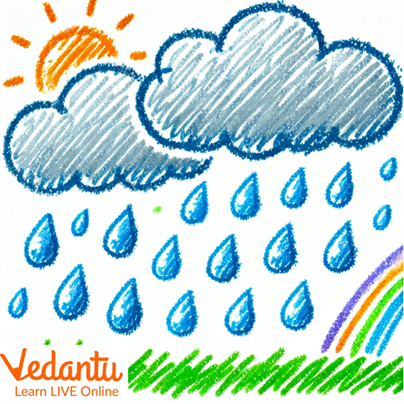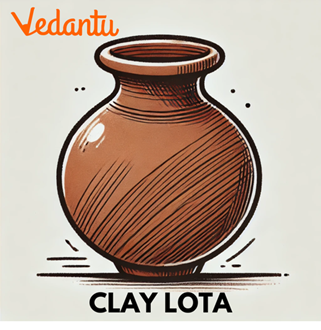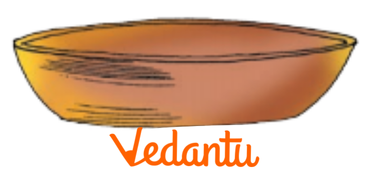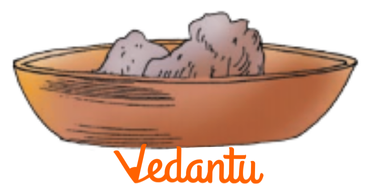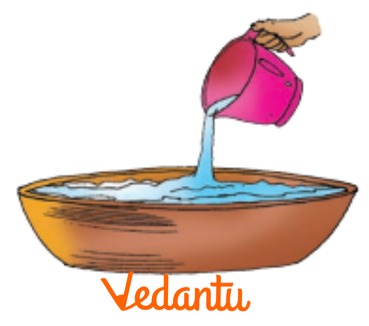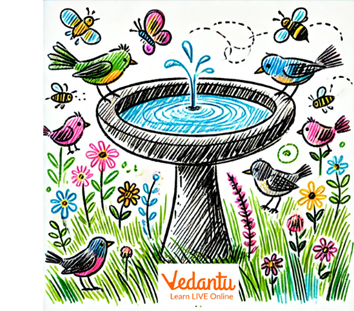Water - A Precious Gift Class 3 Questions and Answers - Free PDF Download
FAQs on NCERT Solutions For Class 3 EVS Chapter 7 Water - A Precious Gift (2025-26)
1. What are the NCERT Solutions for Class 3 EVS Chapter 7: Water - A Precious Gift as per CBSE 2025–26?
NCERT Solutions for Class 3 EVS Chapter 7 provide detailed, stepwise answers to textbook questions about water, its uses, sources, the water cycle, and water conservation. Students learn to answer writing, drawing, and discussion-based questions in a format that matches the CBSE exam pattern. These solutions help clarify concepts and improve understanding for young learners.
2. How does the water cycle work, according to NCERT Solutions for Class 3 EVS Chapter 7?
The water cycle describes how water moves continuously from the earth to the air and back again. It involves:
- Evaporation: Sunlight turns water from rivers, lakes, or soil into vapor.
- Condensation: The vapor cools and forms clouds.
- Precipitation: Clouds release water as rain, which falls back to the earth.
- This cycle keeps replenishing our natural water sources, making water available for all living things.
3. What are the main uses of water highlighted in the NCERT Solutions for Class 3 EVS Chapter 7?
The main uses of water discussed in Chapter 7 include:
- Drinking
- Cooking
- Bathing and cleaning
- Washing clothes and dishes
- Watering plants
- Supporting animals and birds
4. Why is water called a ‘precious gift’ in Class 3 EVS NCERT Solutions?
Water is called a ‘precious gift’ because it is essential for the survival of all living beings. The chapter guides students to understand that water supports plants, animals, and humans, and that it is irreplaceable. NCERT Solutions stress the need to value and use water wisely as per CBSE 2025–26 guidelines.
5. How do NCERT Solutions for Class 3 EVS Chapter 7 help students understand water conservation?
NCERT Solutions include practical activities and questions that teach students how to use water responsibly. Key conservation strategies explained are:
- Turning off taps fully after use
- Fixing water leaks quickly
- Using only as much water as needed
6. What sources of water are explained in the NCERT Solutions for Class 3 EVS Chapter 7?
The chapter lists several sources of water:
- Rainwater
- Rivers and lakes
- Ponds and wells
- Underground water
7. What is the importance of observing water use at home, according to Class 3 EVS Chapter 7 Solutions?
Observing water use helps students understand where water is consumed or wasted in daily activities. By monitoring activities like brushing, washing, or gardening, students learn to spot areas where they can save water and reduce wastage, an important focus in the CBSE 2025–26 curriculum.
8. Can children take any real-life steps based on what they learn in NCERT Solutions for Chapter 7?
Yes, multiple real-life actions are encouraged, such as:
- Creating a birdbath to offer water to birds
- Ensuring taps are tightly closed at home
- Spreading awareness about water conservation among friends and family
9. How are ‘Find Out’ and ‘Activity’ questions in Class 3 EVS Chapter 7 Solutions beneficial?
These questions develop observation, inquiry, and critical thinking skills. Students learn to:
- Investigate how water is used in their surroundings
- Discuss supply sources with elders
- Draw or write about what they learn
10. Are there any common mistakes students make while answering NCERT Solutions for Class 3 EVS Chapter 7?
Common mistakes include:
- Confusing sources of water (e.g., thinking filtered tap water is a separate source)
- Missing the importance of water conservation in their answers
- Not explaining the reasons behind their solutions
11. What if a place does not get enough rain, as per the solutions to Chapter 7?
If an area does not get regular rainfall, residents may face water scarcity. The NCERT Solutions describe how tankers or wells can sometimes supply water, but conservation and careful usage become especially important in such cases.
12. How are the vessels used for storing water different now compared to olden times?
Earlier, people used metal, clay, or stone vessels such as lota and surahi to store water. Nowadays, plastic and steel containers are more common. NCERT Solutions emphasize the value in learning from traditional, sustainable storage practices as discussed in Class 3 EVS Chapter 7.
13. What are some activities that can lead to water wastage or pollution as highlighted in the NCERT Solutions for Class 3 EVS Chapter 7?
Key activities causing wastage or pollution include:
- Leaving taps running when not needed
- Using excess water for cleaning or gardening
- Throwing waste into water sources
14. How can NCERT Solutions for Class 3 EVS Chapter 7 support students preparing for CBSE exams?
The solutions provide stepwise, syllabus-aligned answers to textbook questions, matching CBSE exam style. Practice questions, drawing tasks, and discussion prompts help students prepare thoroughly for both objective and descriptive questions encountered in school assessments.
15. What are Frequently Unasked Questions (FUQs) students might have about Chapter 7, as per new curriculum trends?
Sample FUQs for higher-order thinking:
- What would happen to plants and animals if rain did not occur for a long period?
- How would life change if clean water became very scarce?
- Why is it important to teach water conservation to even very young children?
























